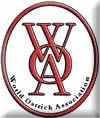 |
WOA Meat Yield ClassificationsMarch, 2003 |
The Meat Yield Classification can be determined by the total yield of Deboned Meat harvested from a bird.
DEFINED: Deboned Meat Weight is the total weight of the Drum Muscle assembly without the leg bone, the Thigh muscle assembly without the Thigh Bone and the Tenderloin muscle.
DEBONED MEAT WEIGHT STANDARD: Silver/Blue skin left on the meat, Major Tendon ends removed. Not included in the weight are: Rib Cage meat, Neck meat, Organ meat or Fat.
YIELD CLASS & Suggested Payment System
(Deboned Meat per carcass for Prime and Choice Grades)
| CLASS |
KILOGRAMS |
POUNDS |
SUGGESTED Payment |
Class 1 |
45+kg |
99+lbs. |
100% Full Price |
Class 2 |
40 to 45 kg |
88 to 99 lbs. |
Less than Class 1 price |
Class 3 |
35 to 40 kg |
77 to 88 lbs. |
Less than Class 2 price |
Class 4 |
30 to 35 kg |
66 to 77 lbs. |
Less than Class 3 price |
Class 5 |
25 to 30 kg |
55 to 66 lbs. |
Less than Class 4 price |
Note: The Yield Class price is directly connected to processing costs per bird. A lower yielding bird warrants a lower price per kg/pound of yield to keep all meat costs the same no matter what Yield Class the meat came from.
Grade, Yield & Payment Overview:
The Grades PRIME and CHOICE are the only grades recommended to be connected with the Deboned Meat Yield Classification & Suggested Payment System in an effort to encourage the farmer to raise quality birds with lots of boneless meat.
This type of bird will almost always mean a bird that has been fed a well-balanced diet that will result in high quality meat with consistent taste and colour. It is recommended that the Yield Classes be a different price per pound/kilo for each different class with Class 1 being the highest paid price per pound/kilo.
It is not recommended to implement the Deboned Meat Yield Classification & Suggested Payment System with the SELECT & UTILITY Grade but rather pay the farmer a single price. The price for UTILITY grade Ostrich should be low enough to discourage this type of Ostrich production. A Non-Food Grade carcass should be of no payment to the farmer and may carry a "charge back" for the slaughtering costs involved.
The Grades of Prime, Choice, Select, and Utility are meat grades and can be implemented with BOTH farmers and consumers alike. The Yield Class & Payment System is a processor/farmer program to encourage the farmer to raise a high quality product that is profitable for the processor to process and market.
Copyright© of the World Ostrich Association, all rights reserved
contact
Secretary & Treasurer:
Craig Culley
33 Eden Grange
Little Corby
Carlisle
Cumbria
CA4 8QW
England
Tel: 01228 562908
email: craig@culley.co.uk
![]()
Get your free copy of Acrobat
Reader to view PDF documents on this site.

